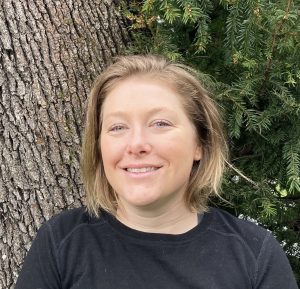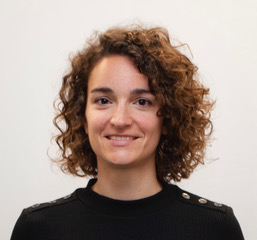We congratulate Rebecca Morris and Laura Mateo, recipients of the 2020 Mineralogical Association of Canada Scholarships.

Rebecca Morris completed her BSc Hons (2010) in Geology at the University of Calgary (Canada). During her undergrad she was advised under Dr. Cathy Ryan, studying stable isotope variations and chloride mass flux of groundwater-surface water interactions within the Calgary area. Post undergrad, she worked as a hydrogeologist before returning to school to study her true passion of igneous petrology and arc geochemistry. She completed her MSc at Western Washington University (USA), advised under Dr. Susan DeBari, on the petrogenetic processes that generated mid- to upper- crustal units of the southern Alisitos arc in Baja California, Mexico.
Rebecca is now pursuing her PhD under Dr. Dante Canil at the University of Victoria (Canada). For her research, she integrates her love of field geology, igneous petrology, and geochemistry by studying magma-wallrock interactions within arc systems. Specifically, she focuses on magma-carbonate interactions, as these have recently been shown to produce significantly more CO2 than previously believed.
To investigate this, she studies the well-exposed Jurassic Bonanza arc (Vancouver Island, Canada), which was built on and intruded older carbonate platforms. She is currently using various tools to trace the assimilation of carbonate into the arc magmas, such as 18O values of mineral and whole-rock chemistry along pluton margins in contact with wallrock. Her work has led to a discovery of unique orbicular-rich dikes, that show physical and chemical evidence of magma-carbonate interactions, and may represent a possible unexplored transport mechanism of CO2 within arc systems.

Laura Mateo completed her BSc in geology (2009) at the University of the Basque Country in northern Spain. Following completion of her BSc degree, she worked as a project geologist for seven years for the Geological Survey of Chile, in Santiago, Chile, working in the areas of metallogenesis of ore deposits. This experience presented her with an opportunity to start her MSc program under the supervision of Drs. John Hanchar and Fernando Tornos at Memorial University of Newfoundland (in St. John’s, Canada).
Laura’s MSc project focuses on studying the eventuality of a genetic relationship between iron oxide-copper-gold (IOCG) and magnetite-apatite (MtAp) deposits. She examined samples from several ore deposits in northern Chile and southern Perú. One of the more interesting locations investigated in her project is the Montecristo district in northern Chile, which has both types of mineralization. Analyses done in her MSc project include Re-Os dating of molybdenite, 40Ar-39Ar dating of actinolite, U-Pb dating and Hf tracer isotopes in zircon, and whole-rock sulfur, Pb, Sr, and Nd isotopes, and EPMA analyses of major and minor elements and X-ray maps of actinolite, and LA-ICPMS analyses of trace elements in actinolite.
The results will help identifying chronological and geochemical similarities in the IOCG and MtAp mineralization types, and determining if they are related or not, as well as finding out if there is a spatial and/or temporal relationship between the Chile and Perú locations. The results from this study will contribute to our understanding of these type of deposits in South America and will be useful for mineral exploration purposes elsewhere in South America and globally.
